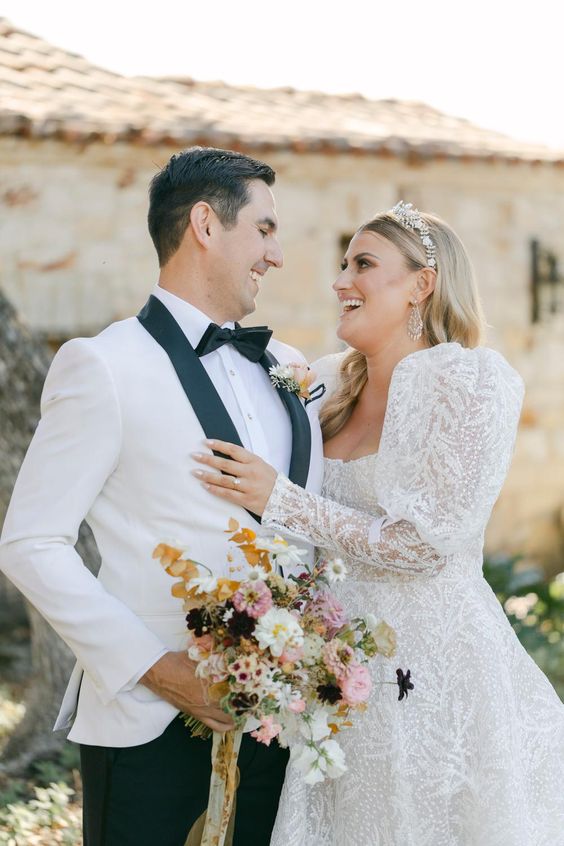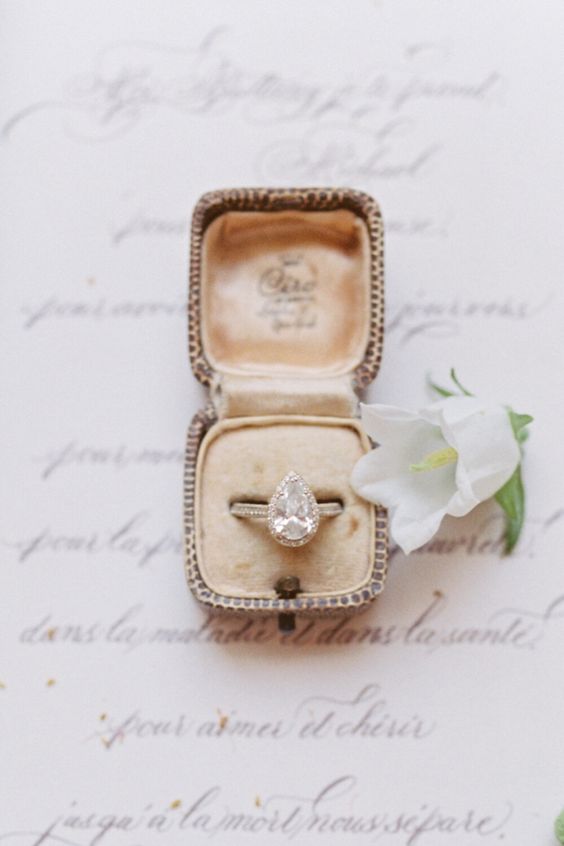Your engagement – that blissful time between saying “yes” and “I do” – comes with its own set of questions and decisions. One of the most common: How long should we be engaged?!
In a nutshell, the perfect engagement length will really depend on a number of personal factors. From budget constraints to the location of your wedding, there are some careful considerations that should influence your decision.
Keep reading as we share the average length of an engagement, the benefits of longer vs shorter timelines, and some practical tips for choosing the right length of engagement for you and your partner.

What is the Average Length of an Engagement for Couples?
Deciding on the right length of engagement can be a significant decision in the wedding planning process. Not only will it impact your planning timeline, it can also influence how much money you can save, availability of vendors, and even whether your guests can attend.
So, with all of this being said – what is the average length of an engagement for couples?
We’ve done the research, and can tell you that the average engagement period typically ranges between 12 to 18 months, with the median duration being around 14 months. However, this can vary from country to country, and really depends on the individual circumstances of each couple.

What Are the Different Factors Influencing Engagement Length?
While the average engagement period sits between 12 to 18 months, there are a number of factors that may influence how long a couple decides to be engaged. These include:
- Age. Younger couples may prefer a longer engagement period to allow more time for planning and financial preparation. On the other hand, mature couples might opt for shorter engagements due to personal or family reasons.
- Cultural and religious norms. Different cultures and religions have varying traditions surrounding engagement length. Some may prioritize longer engagements for elaborate ceremonies or cultural customs, while others may favor shorter engagements for practical reasons.
- Personal circumstances. Individual circumstances such as career goals, financial stability and family dynamics will also play a significant role in determining the length of an engagement.

The Benefits of Planning a Long Engagement: Pros vs Cons
Considering a longer timeframe for your engagement? Let’s weigh up the pros and cons of a long engagement, starting with the benefits!
- Extended planning time. A longer engagement provides ample time to meticulously plan every aspect of your wedding, from venue selection to guest list preparation. You can take your time exploring various options, visiting multiple venues and making important decisions without feeling rushed. This can be particularly beneficial if you’re planning a destination wedding, or a wedding with a large guest list.
- Financial planning. It makes sense that couples can often budget and save more effectively for their dream wedding with a longer engagement. You have the ability to spread out your expenses over a longer period, reducing the financial strain associated with wedding costs. If you’re saving for your wedding from scratch, a long engagement may help you avoid unwanted financial stress.
- Vendor availability. Booking vendors well in advance becomes easier during a long engagement. You’ll be able to secure your preferred venue, photographer, caterer and other key vendors without worrying about availability issues, especially during peak wedding seasons.
Check out the most popular months to get married here!
- Increased guest attendance. A longer engagement means you can inform your guests earlier, making it more likely for them to attend. Your loved ones will be able to mark the date in their calendar ASAP, helping to avoid any potential scheduling conflicts. If you’re planning a destination wedding, a longer engagement period will also give your guests more time to plan and save for their trip.
Now, what about some of the potential downsides to planning a long engagement?
- Increased stress. Extended engagement periods may lead to heightened stress and anticipation. Some couples may feel overwhelmed by the prolonged planning process and the pressure to create the “perfect” wedding day.
- Change of mind. A long engagement period can also increase the likelihood of changing your mind when it comes to details like your wedding theme, dress and decor. There’s a chance that your style and tastes may change within an 18-month period, leaving you second guessing your decisions closer to the date.
Pro tip: Use our wedding vision worksheet and write a wedding mission statement to ensure your special day remains authentic to you and your partner. - Changing circumstances. Major life events such as job changes, relocations or new family dynamics may occur during a lengthy engagement, potentially impacting your wedding plans. There’s a possibility you may need to accommodate unexpected changes, or put things “on hold” until after your wedding.

The Benefits of Planning a Short Engagement: Pros vs Cons
If you’re ready to get married (like, right now) and have the funds to spare, a short engagement might be more your style! Here are some of the most common reasons why couples may prefer a short engagement:
- Efficiency. Shorter engagements streamline the planning process, allowing for quicker decision-making! You’ll have to make fast choices regarding your venue, vendors, and wedding details without procrastinating, making the planning process more efficient.
- No need to wait. If getting married is your top priority (rather than planning an elaborate wedding), it makes sense to embrace a shorter waiting period! A short engagement can fulfill your desire to transition into married life as soon as possible, without all of the bells and whistles.
- Reduced stress. With less time spent planning, couples may experience lower stress levels associated with wedding preparation. There will be fewer opportunities for overthinking or second-guessing decisions, which can lead to a smoother planning experience overall.
- Embrace the trends. If you’re planning your wedding within a short timeframe, it also means your styling and decor choices won’t become “outdated” by the time your special day comes around. This means you can jump on your favorite wedding trends and embrace the current styles and color palettes without any wedding day regret!
Check out our 2024 wedding trends to watch here.
With this being said, there are a few things you’ll need to be wary of when it comes to a short engagement:
- Financial pressure. A condensed timeline may lead to higher stress levels regarding budgeting and financial planning. You’ll need to allocate your resources more efficiently, and make smart decisions to stay within your budget.
- Vendor availability. With a shorter lead time, you may also need to compromise on your choice of venue and vendors. Popular vendors usually book out months (or even years) in advance, which can make it more difficult to find available suppliers who align with your style and budget.
- Reduced RSVP rates. Finally, with less notice time, you may find some loved ones are unable to attend your special day due to prior events or other commitments, leaving you with a smaller guest list than you anticipated.

How to Decide on the Right Length of Engagement for You
Choosing the ideal engagement length really comes down to your personal preferences, budget constraints and readiness for marriage. Still not sure whether a long or short engagement period is right for you? Keep these tips in mind to help you decide.
- Communicate. Have an open and honest discussion with your partner about your shared vision for your wedding and your desired timeline for tying the knot. Discuss factors such as family expectations, cultural traditions, and personal preferences.
- Prioritize your needs. Next, identify your priorities for your wedding day, whether it’s securing a specific venue or accommodating out-of-town guests. Assess how these priorities align with your engagement timeline and whether any adjustments are necessary to accommodate them.
- Assess your budget. Finally, come up with a budget for your wedding and consider whether your preferred engagement length is realistic enough to achieve this. It’s a good idea to map out a savings plan, and compare this with the amount of time leading up to your wedding.
Ultimately, the right engagement length is a deeply personal decision that should reflect your individual circumstances and priorities as a couple. Whether you opt for a long engagement to meticulously plan every detail or a short engagement to accelerate your journey to the altar, what matters most is that your decision feels right for you and your partner!
Recently engaged and not sure what to do next? Check out our guide to the first 8 things you should do after getting engaged right here.






